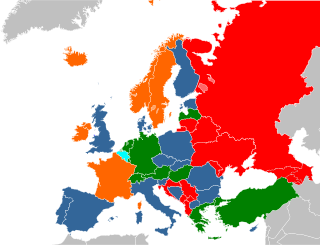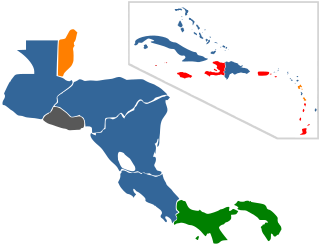Related Research Articles

Nevada is the only U.S. state where prostitution is legally permitted in some form. Prostitution is legal in 10 of Nevada's 17 counties, although only six allow it in every municipality. Six counties have at least one active brothel, which mainly operate in isolated, rural areas. The state's most populated counties, Clark and Washoe, are among those that do not permit prostitution. It is also illegal in Nevada's capital, Carson City, an independent city.

Prostitution in the Netherlands is legal and regulated. Operating a brothel is also legal. De Wallen, the largest and best-known Red-light district in Amsterdam, is a destination for international sex tourism.
Child prostitution is prostitution involving a child, and it is a form of commercial sexual exploitation of children. The term normally refers to prostitution of a minor, or person under the legal age of consent. In most jurisdictions, child prostitution is illegal as part of general prohibition on prostitution.
Prostitution is illegal in Russia. The punishment for engagement in prostitution is a fine from 1500 up to 2000 rubles. Moreover, organizing prostitution is punishable by a prison term. Prostitution remains a very serious social issue in Russia.
Forced prostitution, also known as involuntary prostitution or compulsory prostitution, is prostitution or sexual slavery that takes place as a result of coercion by a third party. The terms "forced prostitution" or "enforced prostitution" appear in international and humanitarian conventions, such as the Rome Statute of the International Criminal Court, but have been inconsistently applied. "Forced prostitution" refers to conditions of control over a person who is coerced by another to engage in sexual activity.
Prostitution in the Czech Republic is legal, but organized prostitution is prohibited. Ever since the Czechoslovak Velvet Revolution (1989) led to the creation of two independent states – the Czech Republic and Slovakia – prostitution has been flourishing and has contributed its share to the region's booming tourist economy. Prostitution is widespread in Prague and areas near the Republic's western borders with Germany and Austria. In 2002, the Czech Statistical Bureau estimated the trade to be worth six billion crowns a year. UNAIDS estimate there are 13,000 prostitutes in the country.

Procuring, pimping, or pandering is the facilitation or provision of a prostitute or other sex worker in the arrangement of a sex act with a customer. A procurer, colloquially called a pimp or a madam or a brothel keeper, is an agent for prostitutes who collects part of their earnings. The procurer may receive this money in return for advertising services, physical protection, or for providing and possibly monopolizing a location where the prostitute may solicit clients. Like prostitution, the legality of certain actions of a madam or a pimp vary from one region to the next.

Prostitution is a type of sex work that involves engaging in sexual activity in exchange for payment. The definition of "sexual activity" varies, and is often defined as an activity requiring physical contact with the customer. The requirement of physical contact also creates the risk of transferring infections. Prostitution is sometimes described as sexual services, commercial sex or, colloquially, hooking. It is sometimes referred to euphemistically as "the world's oldest profession" in the English-speaking world. A person who works in the field is usually called a prostitute or sex worker, but other words, such as hooker and whore, are sometimes used pejoratively to refer to those who work in prostitution. The majority of prostitutes are female and have male clients.
Prostitution is illegal in Egypt. The Egyptian National Police officially combats prostitution but, like almost all other countries, prostitution exists in Egypt. UNAIDS estimate there to be 23,000 prostitutes in the country, including Egyptians, West African and Eastern Europeans.

The legality of prostitution in Europe varies by country.
Prostitution in Armenia is illegal under administrative law. Related activities such as running a brothel and pimping are prohibited by the Criminal Code, although there are known to be brothels in the capital, Yerevan, and in Gyumri. According to UNESCO, since the collapse of the Soviet Union in 1991, prostitution in the country has grown. There are about 5,600 women involved in prostitution in Armenia, roughly 1,500 of them are in Yerevan. However, official police figures are far lower, for example 240 in 2012. Police and other safety forces reportedly tolerate prostitution. Many women turn to prostitution due to unemployment.

Prostitution laws varies widely from country to country, and between jurisdictions within a country. At one extreme, prostitution or sex work is legal in some places and regarded as a profession, while at the other extreme, it is considered a severe crime punishable by death in some other places. A variety of different legal models exist around the world, including total bans, bans that only target the customer, and laws permitting prostitution but prohibiting organized groups, an example being brothels.
Prostitution in Namibia is legal and a highly prevalent common practice. Related activities such as solicitation, procuring and being involved in the running of a brothel are illegal. A World Bank study estimated there were about 11,000 prostitutes in Namibia.

Canada (AG) v Bedford, 2013 SCC 72, [2013] 3 SCR 1101 is a decision of the Supreme Court of Canada on the Canadian law of sex work. The applicants, Terri-Jean Bedford, Amy Lebovitch and Valerie Scott, argued that Canada's prostitution laws were unconstitutional. The Criminal Code included a number of provisions, such as outlawing public communication for the purposes of prostitution, operating a bawdy house or living off of the avails of prostitution, even though prostitution itself is legal.
Trisha Baptie is a Vancouver-based citizen journalist and activist for the abolition of prostitution.

Natasha Falle is a Canadian professor at Humber College in Toronto, Ontario, Canada, who was forcibly prostituted from the ages of 15 to 27 and now opposes prostitution in Canada. Falle grew up in a middle-class home and, when her parents divorced, her new single-parent home became unsafe, and Falle ran away from home. At the age of 15, Falle became involved in the sex industry in Calgary, Alberta.
Nikki Thomas is the former executive director of Sex Professionals of Canada.

Legality of prostitution in the Americas varies by country. Most countries only legalized prostitution, with the act of exchanging money for sexual services legal. The level of enforcement varies by country. One country, the United States, is unique as legality of prostitution is not the responsibility of the federal government, but rather state, territorial, and federal district's responsibility.

Human trafficking in Nevada is the illegal trade of human beings for the purposes of reproductive slavery, commercial sexual exploitation, and forced labor as it occurs in the state of Nevada, and it is widely recognized as a modern-day form of slavery. It includes "the recruitment, transportation, transfer, harboring or receipt of persons by means of threat or use of force or other forms of coercion, of abduction, of fraud, of deception, of the abuse of power, or of a position of vulnerability or of the giving or receiving of payments or benefits to achieve the consent of a person having control over another person, for the purpose of exploitation. Exploitation shall include, at a minimum, the exploitation of prostitution of others or other forms of sexual exploitation, forced labor services, slavery or practices similar to slavery, servitude or the removal of organs."

Sex trafficking in the United States is a form of human trafficking which involves reproductive slavery or commercial sexual exploitation as it occurs in the United States. Sex trafficking includes the transportation of persons by means of coercion, deception and/or force into exploitative and slavery-like conditions. It is commonly associated with organized crime.
References
- ↑ "Ontario court alters sex trade landscape". Occupational Health and Safety Canada. April 3, 2012. Retrieved July 23, 2013.
- ↑ Denis Langlois (July 16, 2012). "Survivors want to help people in sex trade". Owen Sound Sun Times . Archived from the original on December 27, 2013. Retrieved July 23, 2013.
- ↑ Jessica Smith (November 15, 2012). "Child prostitution victims call for group home changes". Metro International . Archived from the original on February 18, 2015. Retrieved July 23, 2013.
- ↑ Victoria Gray (October 3, 2010). "Court decision could accelerate human trafficking". The Toronto Observer. Retrieved July 23, 2013.
- ↑ Laurie Monsebraaten (February 6, 2012). "Poverty fight must go on despite deficit, activists say". Toronto Star . Retrieved July 23, 2013.
- ↑ Corey Mintz (July 5, 2013). "Family has appetite for social issues at dinner with Corey Mintz". Toronto Star . Retrieved July 23, 2013.
- ↑ Madhavi Acharya; Tom Yew (October 5, 2009). "Missing, slain women honoured at ceremony". Toronto Star . Retrieved July 23, 2013.
- ↑ Steffanie Petroni (June 18, 2013). "Legalizing Prostitution: Local and National Consequences". Local2. Archived from the original on October 29, 2013. Retrieved July 15, 2013.
- ↑ Adrian Humphreys (March 26, 2012). "Former and current sex workers at odds over prostitution ruling". National Post . Retrieved July 21, 2013.
- ↑ Julian Sher (June 12, 2013). "Should brothels be legal? Supreme Court of Canada ponders issue". Toronto Star . Retrieved July 23, 2013.
- ↑ Vincent J. Felitti. "Childhood Trauma Linked to Chronic Diseases in Adulthood." Cancer InCytes 2(2), 2013.